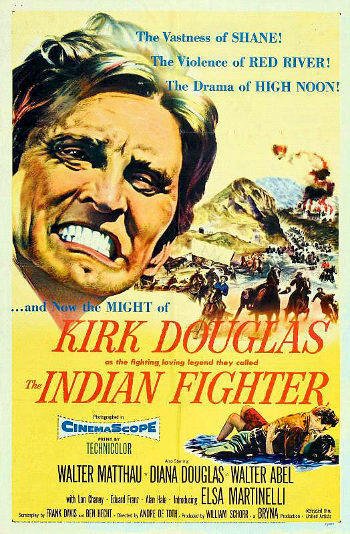 Kirk Douglas is Johnny Hawks, a man known as an Indian fighter but a man who finds himself trying to keep peace between the Sioux and white settlers, then trying to quell an uprising once it starts.
Kirk Douglas is Johnny Hawks, a man known as an Indian fighter but a man who finds himself trying to keep peace between the Sioux and white settlers, then trying to quell an uprising once it starts.
The problem is that gold has been found on Sioux land. Some white men are showing up to swap for that gold; liquor is their favorite commodity to swap. Others are trying to find the source of that gold.
Johnny helps negotiate terms of peace between his Indian friend Red Cloud and the cavalry. He then takes the job of guiding a wagon train through Sioux country to Oregon.
He has an ulterior motive. He wants another chance to see a pretty Indian maiden named Onahti (Elsa Martinelli).
The wagon train includes Susan Rogers, who would like to convince Johnny to settle down as her husband, and her son Tommy, who admires the Indian fighter.
Trouble starts anew when the Sioux show up to trade with the whites in the wagon train. Wes Todd (Waltee Matthau) and Chivington (Lon Chaney), the two men responsible for the initial trouble, are at it again. This time they wind up killing Red Cloud’s brother.
After that, it’s a race back to the fort before the Indians attack. Johnny, after a romantic interlude with Onahti, makes it back too, only to be branded an Indian-loving traitor who abandoned the settlers.
Then again, he might just be the only man who can save the fort, its garrison and those very same settlers.
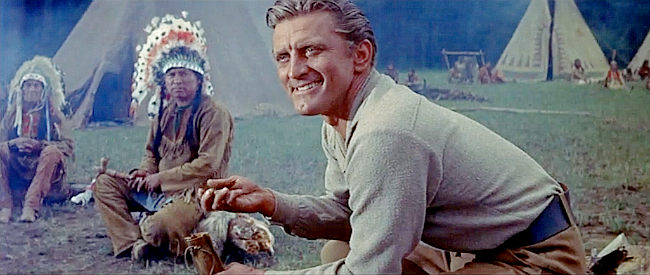
Kirk Douglas as Johnny Hawks, being shown some of the gold found on Indian land in The Indian Fighter (1955)
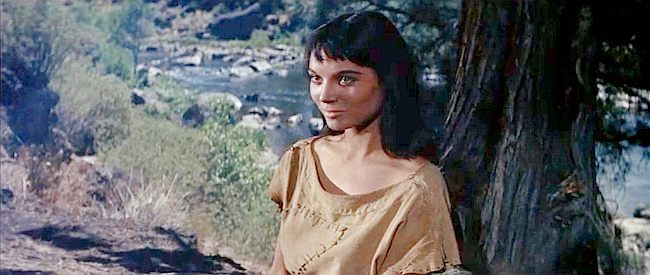
Elsa Martinelli as Onahti, the Indian maiden who captures Johnn Hawks’ attention, then his heart in The Indian Fighter (1955)
Director Andre de Toth serves up a sharp script, a rousing attack on the fort — mostly with fire — and the then scandalous nude bathing scenes featuring Elsa Martinelli in her first film role.
Unfortunately, the film is also too chock full of cliches to be wholly successful. We have the chief who wants peace and a brother who wants war. We have the female settler trying to convince a frontiersman to settle down.
And we aren’t 10 minutes into the film, and the Indian fighter — somehow great friends with a great Sioux chief — is already challenging a brave to one-on-one combat.
This was the first film from Douglas’ own production company, Bryna (named after his mother). The role of Susan Rogers is played by his ex-wife, Dianna Douglas.
In his autobiography, Douglas says Martinella, previously a model, thought someone was playing a joke on her when he called, inviting her to test for the role of the Indian maiden. Only after he sang her a song was she convinced she was speaking to the real Kirk Douglas. She went on to make several more films, including the lead role in the 1969 Spaghetti Western “The Belle Starr Story.”
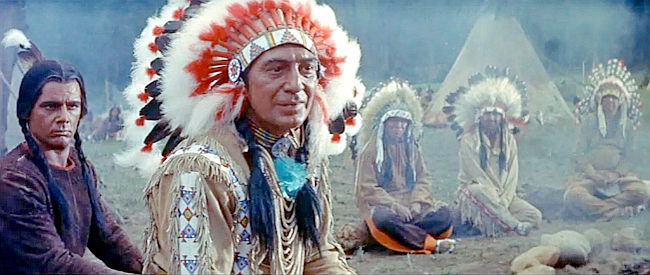
Eduard Franz as Red Cloud, explaining to Johnny Hawks the problem gold-hungry whites are causing in The Indian Fighter (1955)
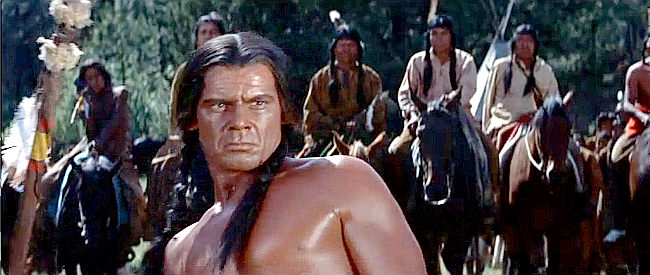
Harry Landers as Grey Wolf, Red Cloud’s brother, finding gold-hunting whites on the Indians’ land in The Indian Fighter (1955)
Directed by:
Andre de Toth
Cast:
Kirk Douglas … Johnny Hawks
Wes Todd … Walter Matthau
Chivington … Lon Chaney
Elsa Martinelli … Onahti
Diana Douglas … Susan Rogers.
Eduard Franz … Red Cloud
Harry Landers … Grey Wolf
Alan Hale … Will Crabtree
Walter Able … Capt. Trask
Elisha Cook Jr. … Briggs
Ray Teal … Morgan
Frank Cady … Trader Joe
Michael Winkelman … Tommy Rogers
William Phipps … Lt. Blake
Hank Worden … Crazy Bear
Runtime: 92 min.
Songs:
“One Wore Blue, One Wore Gray”
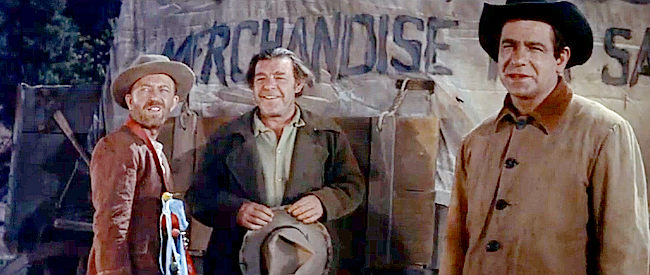
Walter Matthau (right) as Wes Todd and Lon Chaney (middle) as Chivington, two of the traders causing trouble in The Indian Fighter (1955)
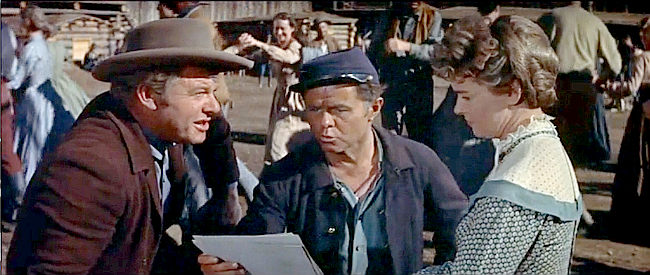
Alan Hale as Will Crabtree, Elisha Cook Jr. as a photographer named Briggs and Diana Douglas as Susan Rogers in The Indian Fighter (1955)
Memorable lines:
Johnny Hawks, when Grey Wolf warns him he isn’t welcome in Indian territory: “You’ve grown a big mouth since I saw you last, Grey Wolf. But I didn’t come here to talk to a big mouth. I came here to talk to a big man (Red Cloud).”
Red Cloud, showing Johnny Hawks the bodies of two Indians hanging from tree limbs because they defied orders not to trade with whites: “They broke the law.”
Johnny Hawks: “They look sorry for it.”
Tommy Rogers, as his mother whisks Johnny Hawks off to dance: “Mom, he shouldn’t dance — he’s an indian fighter.”
Johnny Hawks: “That’s alright, Tommy. This is a war dance.”
Johnny Hawks: “To me, the West is like a beautiful woman, my beautiful woman. I don’t want her changed. I don’t want to share her with anyone.”
Johnny Hawks, upon tracking down Todd and Chivington and being offered part of their gold: “I’m not here for gold. Just for you two nuggets.”
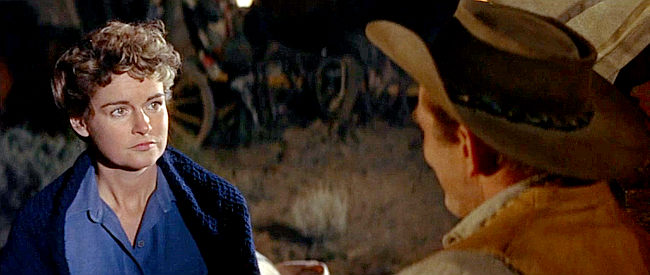
Diana Douglas as Susan Rogers, trying to convince Johnny Hawks to settle down on a homestead in The Indian Fighter (1955)
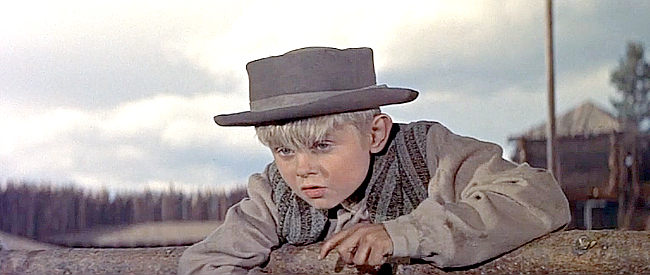
Michael Winkelman as Tommy Rogers, fascinated with Johnny Hawks because of his Indian fighting repution in The Indian Fighter (1955)
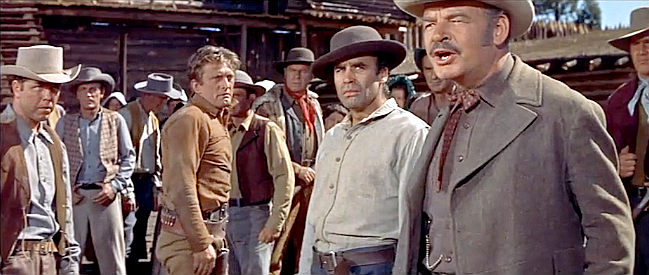
Ray Teal (right) as Morgan, accusing Johnny Hawks of conspiring with the Indians in The Indian Fighter (1955)

Kirk Douglas as Johnny Hawks, admitting to leaving the wagon train to visit an Indian girl in the Indian Fighter (1955)
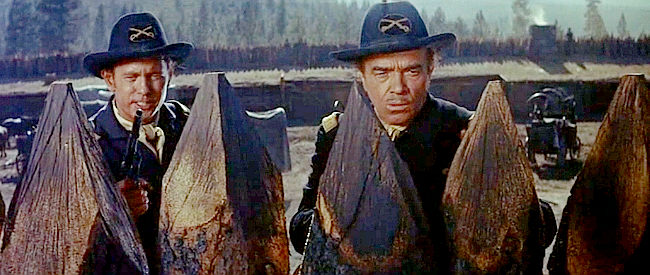
Walter Able (right) as Capt. Trask, watching Johnny Hawks leave the beseiged fort in The Indian Fighter (1955)
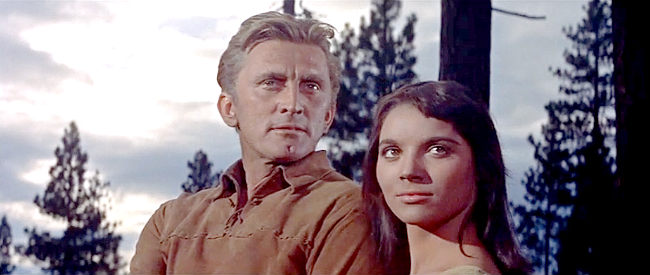
Kirk Douglas as Johnny Hawks and Elsa Martinelli as Onahti, wondering if they’ll be able to enjoy a future together in The Indian Fighter (1955)

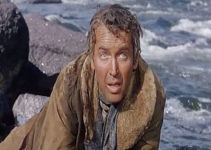
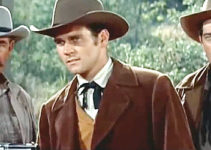
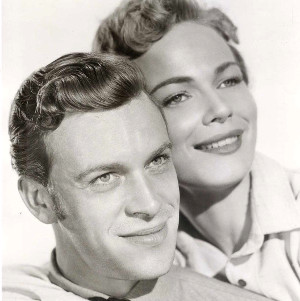
Con todo respeto, este no fue el único western de Elsa Martinelli. En 1968 ella protagonizó junto a Robert Woods ” The Belle Starr Story”